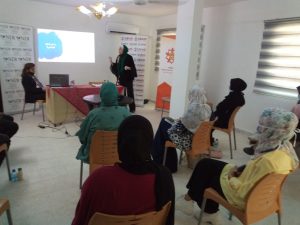
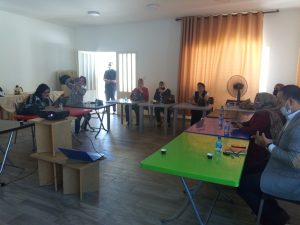
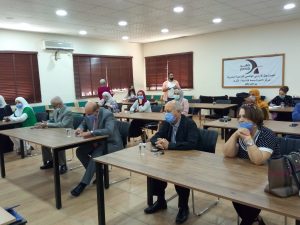
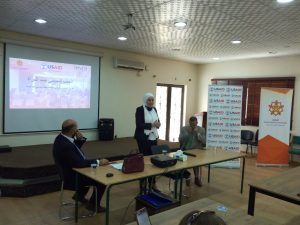
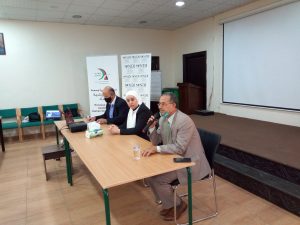
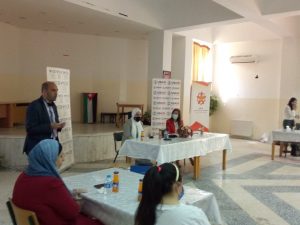
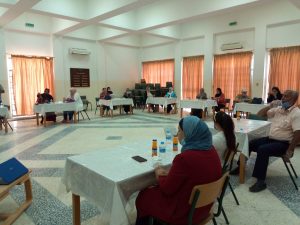
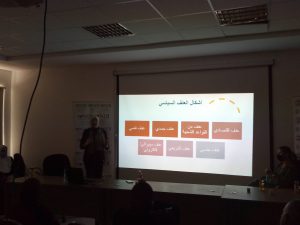
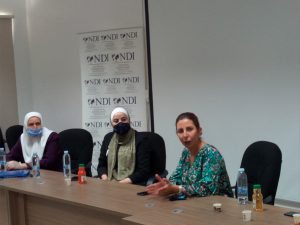
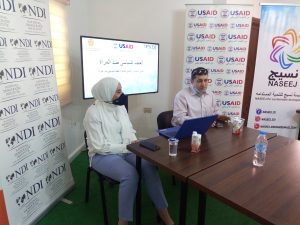
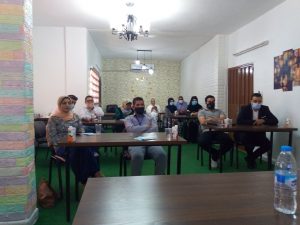
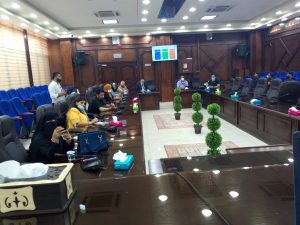
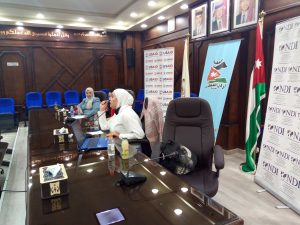
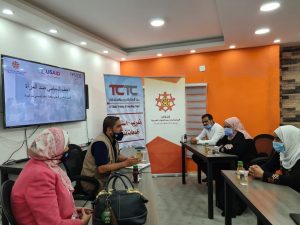
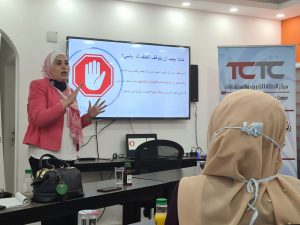
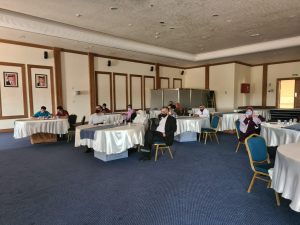
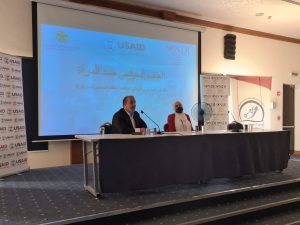
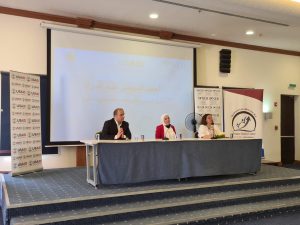
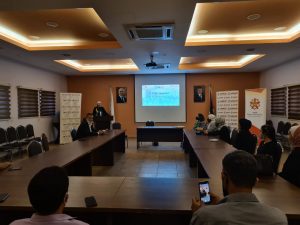
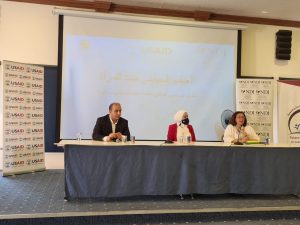
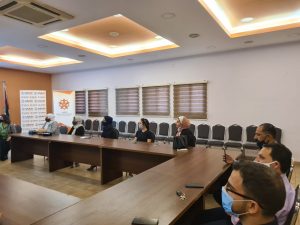
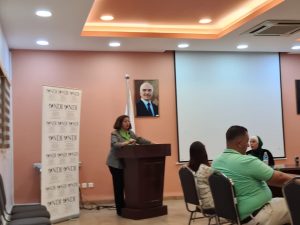
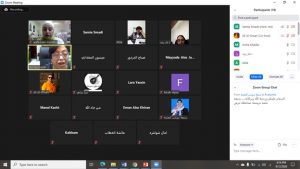
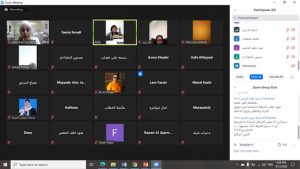
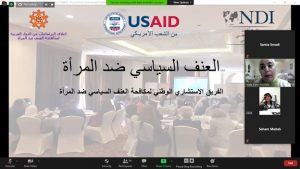
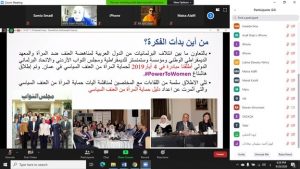
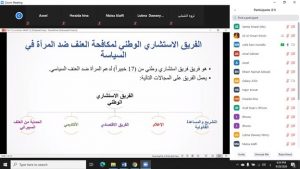
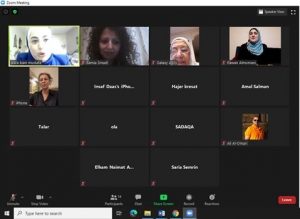
The National Advisory Team to Combat Political Violence against Women, began on 23/8/2020 multiple tours in the Kingdom’s governorates to raise awareness on political violence against women.
The Chairperson of the coalition, H.E. Wafa Bani Mustafa, spoke in all tours in all governorates about:
The definition of political violence and the international efforts to combat political violence against women, including: The efforts of the National Democratic Institute, which launched an initiative in 2016 entitled: (Not the Cost) to highlight the importance of eliminating political violence against women. The institute also launched an application entitled (Think 10), which is an electronic tool to measure the extent of violence against women in decision-making positions. This in addition to the efforts of the Westminster Foundation for Democracy that held an international Conference on Violence against Women in Politics in London in 2018, the meeting brought together 54 speakers and 150 participants from more than 20 countries, highlighting the sources of violence against women in politics, global similarities and differences in each country. As well, the Inter-Parliamentary Union conducted a study of 45 countries with the following results: 81% confirmed the presence of psychological violence, 44% were threatened with death, rape or beating, and 15% experienced sexual violence, and 65% experienced sexual comments.
She indicated that the idea of combating political violence against women originally came through an initiative launched in Amman on May 4, 2019 to protect women from political violence in cooperation between the Coalition of Women MPs from Arab Countries to Combat Violence against Women, the National Democratic Institute, Westminster Foundation for Democracy, the Jordanian Parliament, and the Inter-Parliamentary Union. The hashtag #PowerToWomen was launched during that event. The launch was followed by a series of meetings with specialists to discuss mechanisms to protect women from political violence, which resulted in the preparation of a guide to protect women from political violence.
Regarding the guide on violence against women in politics, which will be launched for the first time in the Arab world in both Arabic and English, MP. Wafa indicated that the guide included: the definition of political violence, the characteristics of political violence. Politicians affected by political violence, perpetrators of political violence, forms of political violence, effects of political violence, and precautionary measures to prevent political violence. She indicated that political violence has multiple forms: economic violence, violence from constituencies, physical violence, psychological violence, sexual violence, legislative violence, and electronic / cyber violence.
She indicated that a national advisory team was formed to combat political violence against women, consisting of 17 experts to support women against political violence and works through the following sub-teams: legislation and legal aid team, the media team, the economic team, and the academic team. And the Cyber Violence Protection Team.
She indicated that what can be done to confront political violence is to build supportive mechanisms, such as: the affiliation to political parties and blocs in parliaments, and forming parliamentary women’s caucuses. She indicated that it is possible to confront those who practice violence using: the bylaws, codes of conduct, and conduct committees, and through the use of the media and civil society to confront those who practice political violence. Moreover, through special training for women politicians on confrontation using best practices, and integrating political violence in national legislation. She indicated that political parties and civil society institutions should play a greater role by: educating male members about the importance of the role of women and protecting them from violence, strengthening women’s political capabilities, including negotiations and campaigns, promoting gender-sensitive budgets, and allocating leadership seats for women during the elections and within parties.
She indicated the need for the media to play a positive role in supporting women by holding workshops and special training for media professionals in the field of political violence, with a focus on cyber violence in the media.
She indicated that political violence must stop because it has become a threat that threatens all efforts to achieve equality and reduce the gender gap. Moreover, many women politicians and leaders have left their positions due to political violence, and political violence has become a negative message to future young female leaders.
She concluded by stating the parties that women who are exposed to political violence can turn to, including the Family Protection Department, the Cyber Crimes Unit, the Coalition of Women MPs from Arab Countries to Combat Violence Against Women, and the National Advisory Team to Combat Political Violence against Women.
In Mafraq Governorate, on 23/8/2020:
Ms. Mayada Abu Jaber, a member of the National Advisory Team to Combat Political Violence against Women, spoke about cyber violence and indicated that “the virtual world can spread any kind of ideas, so we must be aware of this danger.” She emphasized that more than 85% of Jordanians use the Internet, according to the data published on the “Internet World Stats” website, and that they use Facebook the most, then comes WhatsApp, then YouTube, then Google Search Engine, and then Twitter. She indicated that the number of Facebook users reached 5.8 million users, equivalent to 57% of the Internet users in the kingdom.
Regarding the best way to deal with Facebook, she indicated the importance of building a content, which is divided into written contents, pictures, and videos, and that must convey the idea with fewer words, less time or expressive photography directly. This in addition to the need to use a (Page) for the election campaign and not other mechanisms that may be less effective such as the (Groups) or the use of the personal page. She recommended the importance of using the natural spread (organic posts) and (Paid Marketing) alternatively, the use of the feature of determining the age group and determining the area of spread within the constituency, and the use of the property that determines the characteristics and interests of the target group through what is called “targeted marketing”
She indicated that WhatsApp is used by 71% of Jordanians and stressed the importance of using it by the parliamentary elections candidates by focusing on the network mostly used in their regions whether it’s (Orange, Zain, or Umniah) and by contracting with these companies by sending messages about their campaigns on WhatsApp extensively to the largest number of WhatsApp users. Regarding YouTube application, Abu Jaber indicated that 66% of Jordanians use it. She also pointed out that a study conducted by “Forbes – Middle East” magazine listing the most 25 popular programs on YouTube in the Arab world, revealed that Jordanian programs came in the second place after Saudi Arabia. As for Google, she emphasized the importance of using the so-called Search Engine Optimization to let the candidates appear among the most visible results. On Twitter, she indicated that the ads on it are expensive, but female candidates can resort to influencers on Twitter to promote their election campaigns and use popular hashtags.
She emphasized that when running for office, a woman moves from being a private person to a public figure. She stressed the importance of seeking the assistance of specialists, and the importance of distinguishing between freedom of expression, personality assassination and cyber violence. She stressed the importance of the candidate taking the following steps in the event of being exposed to cyber violence, including: blocking abusive followers, filtering all comments, and such comments will be automatically hidden from Facebook, in addition to the importance of taking legal measures against abusers based on the Cybercrimes Law.
In Zarqa Governorate, on 24/8/2020
The meeting was moderated by Mrs. Hayat Al-Zawahra, Rapporteur of the Jordanian Women’s Committees Association in Zarqa.
Bani Mustafa spoke about political violence and the National Advisory Team to Combat political violence against Women, in addition to the guide on political violence against women, which the coalition prepared in cooperation with the National Democratic Institute. She indicated that women have a good opportunity through political parties, as the Financial Contribution Regulation to Support Parties No. 155 for the year 2019 encourages the nomination of women by political parties. This regulation increased the financial incentives for party candidates in parliamentary elections and added 15% to these incentives, if the candidates are women or young people under 35 years of age. She emphasized that political violence was not mentioned in the national laws except in Tunisia through the Law on the Elimination of Violence against Women. She indicated that at the beginning of the launch of the initiative to protect women from political violence, everyone was surprised at the existence of the so-called political violence against women, but when it was explained to everyone, the concept became clear to questioners.
Dr. Salma Al-Nims, Secretary-General of the Jordanian National Commission for Women Affairs, indicated that most women in decision-making positions face the struggle for power and that society cannot accept the idea of women being in leadership positions because this threatens men’s interests. She indicated that bullying may occur because of the attitudes we adopt, in addition to the stereotype about women in decision-making places, as there is a widespread belief that women in such positions do not care about their homes and families. She said, “I believe that a woman can change her society and may be a leader even when she is at home, and a man is not a leader in DNA, and a woman makes a double effort to prove herself.”
In Karak Governorate, on 25/8/2020
The meeting was attended by the President of Karak Governorate Council, Mr. Sayel Al-Majali, and the Director of Princess Basma Center for Development in Karak, Mr. Ali Al-Sa`oub.
Bani Mustafa spoke about political violence and the National Advisory to Combat Political Violence, in addition to the guide on political violence against women, which the coalition prepared in cooperation with the National Democratic Institute. She indicated that the World Economic Forum’s gender gap index for the year 2020 indicated that Jordan was able to achieve a good position in bridging the gender gap in health and education, as it ranked 81 out of 153 countries in education and ranked 103 out of 153 in health. But the country couldn’t bridge the gap in terms of economic and political participation, as it ranked 145 out of 153 countries in economic participation and ranked 113 out of 152 countries in women’s political participation.
She indicated that the whole world began to pay attention to political violence, and the first institution to refer to it was the National Democratic Institute in 2016 through launching (Not the Cost) initiative, which aims to ensure that women do not bear an additional price for their participation in public life. She said: “The presence of women on the table makes decisions more responsive to governance.” Regarding the forms of political violence, she indicated that what is currently being most witnessed is cyber violence, and said: “There is a general state of confusion between constructive criticism and character assassination.” She added, “The nature of Jordanian society does not accept criticism being directed against wives, sisters, and mothers.” She indicated that one of the ways to confront political violence is to formulate codes of conduct in various institutions because of their influence in controlling any behavior that might expose women to political violence, and she said, “I encourage every institution to issue codes of conduct that define professional cooperation among all.”
She stressed the importance of promoting gender-sensitive budgeting and that political parties will seek women candidates because of the new regulation (Financial Contribution Regulation to Support Parties No. 155 for the Year 2019) which encourages parties to nominate women by increasing the percentage of incentives for them if they do so.
Dr. Hussein Mahadin, a member of the National Advisory Team to Combat Political Violence against Women, spoke about the societal culture, as he explained that what we face today in terms of attacks on social media is a reflection of the culture of the society. He indicated that discrimination begins with the family, then the school, then the university, and then the society, which generally tends towards negative discrimination against women. He indicated that although the Jordanian society is an educated society, but when it comes to dealing with social networks, it still needs knowledge in dealing with these sites.
He indicated that with Jordan’s turnout for the elections, awareness must be raised towards women candidates, but in light of the Corona pandemic, which entails reducing direct dialogue with voters, this matter may not do justice to women, but he stressed that “a good presentation is half a victory.” pointing to the skills that candidate women should enjoy. He stressed the importance of investing in strength points in terms of benefiting from the quota, stressing the importance of supporting women to win outside the quota as well.
In the Governorate of Madaba on 26/8/2020:
The meeting was moderated by Mr. Majed Redaouneh, President of the Madaba Cultural Forum
Bani Mustafa talked about political violence and the National Advisory Team to Combat political violence, in addition to the guide on political violence against women that the coalition prepared in cooperation with the National Democratic Institute. She indicated that economic violence against women leads to a lack of financial independence and will make women’s decisions linked to what the men want. She indicated that women can overcome political violence if they join women’s caucuses and gatherings in parliaments and by resorting to the bylaws and codes of conduct. She said: “Joining women’s blocs and caucuses achieves a form of strength and protection.”
H.E. Samar Hajj Hassan, a member of the National Advisory Team to Combat Political Violence against Women, indicated that Jordan enjoys a wise leadership that believes in women and their role in society in all activities, and a legislative environment supportive of women and that there is positive discrimination for their participation in political life. She stressed the importance of benefiting from civil society institutions and their openness to the participation of women. She said, “But there are fundamentals a woman should have so that she can practice her life and role.” She indicated that political parties do not give women sufficient space to have a fundamental role in the party. She indicated that violence is practiced against women through customs and school curricula, and stressed that every woman, anywhere, can be a model for future generations. She indicated that women who will go to the elections for the first time will be exposed to a lot of violence, especially cyber violence. She also indicated that women are more likely to be exposed to bullying and persecution of their private lives than men. “With the guide on political violence against women, women will be prepared for what they will face while participating in public life,” she said.
She concluded, “We as women are an active element in society and the violence we are exposed to can affect us and our children in the future.”
In Jerash Governorate on 27/8/2020:
Bani Mustafa talked about political violence and the National Advisory Team to Combat Political Violence, in addition to the guide on political violence against women that the coalition prepared in cooperation with the National Democratic Institute.
Ghada Saba, a member of the National Advisory Team to Combat Political Violence against Women, pointed out the importance of the female candidate being aware of everything that may distort her reputation on social media sites before running for elections, because the similarity of names sometimes between them and someone may affect their reputation and thus reduce the chance of getting votes. She indicated that the violence to which women in particular is exposed is focused on their appearance and families, and she said: “ Female candidates should have all the possible responses to bullying ready in their minds.” She indicated that as a journalist, she is also being criticized, noting the importance of changing the culture of society through drama. She indicated that there are no women as editors-in-chief or media station owners. She said, “The presence of women as editors-in-chief, for example, enhances the presence of women politically.” She indicated that the way a political woman deals in the media differs from the way a political man deals in the media. She stressed the importance of going to Instagram to gain support from young people, as the largest number of Instagram users are young people.
In Tafileh governorate:
On Aug 30, MP Wafa Bani Mustafa led the workshop on VAW-P in Tafileh and heard various opinions, some opposing the concept of political violence, claiming that it doesn’t exists in Jordan, while others shared their very own experience of facing numerous obstacles due to being women in leadership positions. One female participant said that when she was appointed as head of her directorate in one of the governmental institutions in her city, many employees refused to go to work claiming that “they don’t get orders from women”.
In Maan governorate:
On Aug 31, As a part of the series of awareness sessions on Violence against women in politics (VAW-P), NDI’s Women’s Political Participation Program with MP Wafa Abu Mustafa headed to Maan to hold the workshop alongside Ex-Minister Reem Abu Hassan, who is also a member of the National Advisory team to counter VAW-P. After MP Wafa’s presentation, Mrs. Reem gave personal examples of different types of violence she was exposed to due to her being a woman. Additionally participants in the session provided several recommendations for the guide on fighting VAW-P, among these recommendations were including “interfering in female decision- makers personal life” as a form or political violence, and using the term “violence against women in decision-making positions” as an equivalent or alternative to political violence against women, and studying the cases of women in manegerial positions to see if they undergo cyber violence.
In Aqaba governorate:
Sept 1, NDI’s Women’s Political Participation Program headed to Aqaba with MP Wafa Abu Mustafa and Ex-Minister Reem Abu Hassan and presented the topic of VAW-P to an audience from civil society organizations, media persons and activists. With a large number of the participants consisting of youth, the session tackled how youth and CSOs could contribute to fighting VAW-P and supporting women in decision making roles.
In Ajloun governorate
On 7/9/2020, in the presence of 13 participants representing civil society organizations, the National Advisory Team headed to the Governorate of Ajloun to spread awareness among the attendees about political violence that hinders women from fulfilling their role in public life. MP. Wafa Bani Mustafa introduced the definition of political violence, its forms, and the guide to combat political violence, prepared by the National Advisory Team. She also highlighted the entities that women facing violence can resort to should they face any form of political violence to seek the help of the expertise of the National Advisory Team to Combat Political Violence against Women. She also discussed what can be done to confront such violence. The attendees focused on cyber and its effects.
In Irbid governorate
On 7/9/2020, the National Advisory Team went to the governorate of Irbid to educate representatives of civil society organizations about political violence against women, in the presence of 12 participants, and MP. Wafa Bani Mustafa, a member of the National Advisory Team to Combat Political Violence against Women, explained the importance of promoting women’s political participation to avoid associating women with their stereotypical roles. She indicated that Jordan, on the World Economic Forum index, has managed to achieve higher ranks in terms of closing the gender gap in health and education, but in terms of political and economic participation the gap is still huge.
In Amman
On 9/13/2020, the session to raise awareness about political violence against women was held through Zoom, in the presence of 32 participants. Among the speakers, was H.E. Asma Khader, a member of the National Advisory Team. She pointed out the cyber violence that a female candidate with disabilities in Jordan was subjected to recently. She showed that violence has multiple forms, including verbal abuse, accusation, defamation, and the use of physical force. She said: “Violence requires a more firm position, rejecting the silence of the culture and searching for practical mechanisms that limit violence.” H.E. Abla Abu Ilba, a member of the team, indicated that violence has direct and indirect forms and that it sends wrong messages to future generations because entering political life will cost a lot. She stressed the importance of having women enjoying courage and strength and said: “Women should not get used to victimizing themselves, because Women can overcome difficulties.” She indicated that one of the most important factors in strengthening the role of women is the acceptance of pluralism and the reinforcement of the concept of accepting others who differ in gender, religion and political opinion. MP Wafa Bani Mustafa, a member of the team, explained that political violence leads to the return of women to their stereotypical role and reduces the ability of women to participate in public life. She highlighted the forms of political violence, how to confront them, and the entities that women can resort to if they encountered political violence.
Mayada Abu Jaber, also a member of the National Advisory Team, touched on the types of cyber violence.
Balqa Governorate session
On Sep. 28, 2020, the National Advisory Team for Combating Political Violence against Women held a session through Zoom, in the presence of 24 participants including women activists from the Balqa governorate. H.E. Jumana Ghunaimat, a member of the advisory team pointed out the importance of the guide prepared by the team in light of the increase in violence against women and its various forms, especially violence on social media. She said, “Our biggest challenge is social media and the chaos that individuals create on social media, which is directed at attacking women in public life.” She indicated the need to empower women through spreading awareness and by providing them with the necessary tools that can mitigate political violence practiced against them. She stressed on media as an important tool to reduce political violence practiced against women in leadership positions. “This can be done hrough conducting awareness media campaigns, mobilizing supporters for women in media organizations, and drafting codes of conduct in all media organizations.” She said. She emphasized the importance of re-defining freedom of expression, and amending discriminatory legislation to reduce bullying and political violence against women. “Bullying practiced on women leads to the withdrawal of women from public life to protect their families from media attacks, and this thus deprives the state of benefiting from the capabilities of these women who are able to change,” she said.
H.E. Wafa Bani Mustafa, focused on the definition of political violence and the international efforts to combat political violence against women, including: the efforts of the National Democratic Institute, Westminster Foundation for Democracy, and the Inter-Parliamentary Union. She indicated that the idea to combat political violence against women came in cooperation between the above mentioned pioneering NGOs, the Jordanian Parliament and the Coalition of Women MPs from Arab Countries to Combat Violence Against Women, where an initiative was launched on May 4, 2019 to protect women from political violence in Amman.
She talked about the guide on political violence against women, and indicated that political violence has multiple forms, namely: economic violence, violence from the grassroots, physical violence, psychological violence, sexual violence, legislative violence, and cyber violence. Moreover, She indicated that a national advisory team to combat political violence against women has been formed, which consists of 17 experts to support women against political violence.
The efforts of the team proved to be fruitful as the team started receiving complains of VAWP and started interacting with the ladies who sent the complains to guide them on the best practices and to provide them with the appropriate legal advices to confront violence. The complains revolved around suppressing women from practicing freedom of expression, threatening their career life, and bullying on social media.

 العربية
العربية